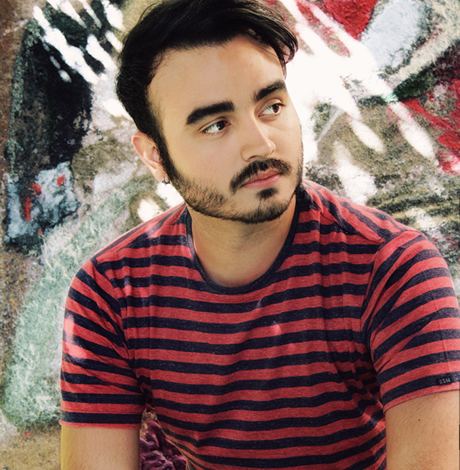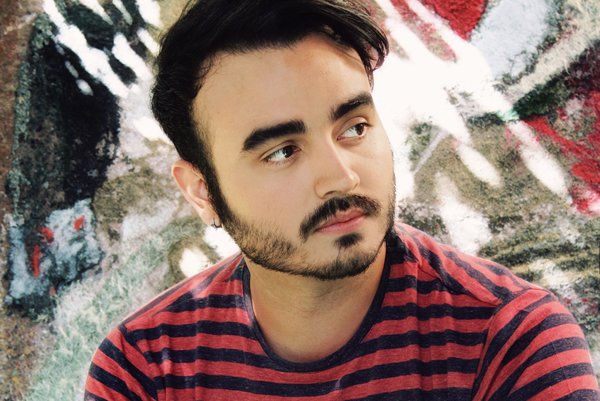Arts & Entertainment
Gay Venezuelan ‘artivist’ fights homophobia, discrimination

Daniel Arzola is behind the “I’m Not a Joke” campaign, which features a series of 50 posters that contain a sentence and a digital illustration.
The campaign — known as “No soy tu chiste” in Spanish — has appeared in the U.S., Venezuela, Brazil, Australia, Uganda, Russia and two dozen other countries around the world. Arzola’s posters have also been translated into English, Portuguese and 18 other languages.
“It’s about being different,” Arzola told the Washington Blade on April 14 during an interview at Amherst College where an LGBT student group had invited him to speak.
Katy Perry selected several of Arzola’s posters for Madonna’s Art for Freedom, a project for which she is a guest curator.
Arzola told the Blade that his life changed when Madonna tweeted a picture of one of them on Oct. 8, 2013.
“At that moment ‘I’m Not a Joke’ was not only for activists,” said Arzola. “I received a lot of interview (requests) from a lot of countries. And the people from Venezuela who hate me knew my work because Madonna made that tweet.”
“It’s a little cliché but Madonna changed my life,” he added.
‘They tried to burn me alive’
Arzola, 26, grew up in Maracay, a city that is roughly 70 miles south southwest of the Venezuelan capital of Caracas.
Arzola, who has an older brother, told the Blade that he was a “very shy” and “lonely” child. He said that he used “art to communicate with other people.”
“If I liked you, I preferred to give you (a drawing) than to talk to you,” said Arzola.
Arzola said he came out to his mother when he was 5, telling her that he liked a boy in his kindergarten class.
“I told her and she beat me,” said Arzola.
Arzola told the Blade that his mother, who is a teacher, is “not homophobic anymore.” He said she now wears a t-shirt that promotes his art in her classroom.
“She’s like my biggest fan all the time,” said Arzola.
Arzola said that three of his neighbors attacked him when he was 15.
He told the Blade that they took off his pants and shoes before tying him to a telephone poll with cables. Arzola said he was able to escape when one of his attackers tried to find gasoline to set him on fire.
He told the Blade that his assailants destroyed all of his drawings.
“They tried to burn me alive because that’s the way that some people in Venezuela react to the differences in another person,” Arzola told the Blade. “It’s not only if you’re gay.”
Arzola said he was unable to draw for the next six years “until one day I understood that my story is not the only story and I had the luck to escape and survive.” He told the Blade that an 18-year-old man from Maracay who was attacked because of his sexual orientation suffered burns over nearly 50 percent of his body.
“There’s a lot of people burning people alive or hurting other people in Venezuela for being gay,” said Arzola.
The U.N. Office on Drugs and Crime notes that Venezuela has one of the world’s highest homicide rates. A deepening economic crisis has caused a shortage of basic goods, triple-digit inflation and growing political and social instability.
Tamara Adrián, a Caracas lawyer who is a member of Popular Will, a left-leaning party, in December became the first openly trans person elected to the Venezuelan National Assembly. Anti-LGBT violence and discrimination remains pervasive in the South American country in spite of this historic election.
Arzola, who studied graphic design and art in Venezuela, told the Blade that he wanted to use art as a way to challenge anti-gay violence and homophobia in his homeland.
“This is the way that artivism burns in my head,” he said. “I need to fight violence with other things and in Venezuela being gay is always in the media. People laugh about being LGBT, so I was wondering (about) when we start to laugh about tragedy, about the pain of others. In Venezuela people are always saying that, ‘We’re so cool because we find a joke in everything.’ But that everything sometimes includes the pain of others.”
“That’s where the name ‘I’m Not a Joke’” comes in,” added Arzola. “I want to talk with people like you and me, so I’m not your joke. I’m not a joke.”
Threats forced Arzola to move to Chile
Arzola told the Blade that he began to receive threats because of his art and advocacy.
“I had to leave Venezuela because of threats,” he said. “When ‘I’m Not a Joke’ started to be so famous I had the opportunity to talk to so many media, so I exposed the government and the homophobia in Venezuela.”
Arzola met Jaime Parada — a Chilean LGBT rights advocate who became the first out candidate elected to public office in the South American country in 2012 when he won a seat on the Providencia Municipal Council in Santiago — in 2014 during a trip to Buenos Aires.
Arzola moved to Santiago, which is the Chilean capital, in April 2015. He now lives in Providencia — a wealthy Santiago enclave — and works for the municipal government.
“I like Santiago,” Arzola told the Blade. “It’s the first time in my life I have experienced peace…and for me it’s something new. For me it’s very weird being in my bed without fear.”
“For me coming from the chaos in Venezuela and being in Providencia is like, ‘Oh yeah. I create all the time with chaos and now I am in peace. I’m like, what should I do now?’” he added. “I don’t know what to do with so much peace. I’m still creating.”
Television
ICYMI: ‘Overcompensating’ a surprisingly sweet queer treat
A sweet, savvy show about breaking free to embrace your true self

Pride month 2025 is now behind us, and while it’s safe to say that this year’s celebrations had a darker edge than usual, it’s also true that they came with a particularly rich bounty of new queer movies and shows to entertain us – so many, in fact, that even if we are facing a lull until the fall another harvest of fresh content, there are still plenty of titles – which, for whatever reason, were off your radar – for you to catch up on in the meantime.
One of the most notable of these – the bingeworthy series “Overcompensating” (now streaming on Amazon Prime) – will most definitely have been ON the radar for the plentiful fans of creator and star Benito Skinner, the actor/comedian who rose to viral fame through his content on platforms like Instagram, YouTube, and TikTok. For anyone else, it might have easily slipped through the cracks.
Created and written by Skinner as a loosely autobiographical “college comedy,” it aims for the kind of raucous, explicitly sexed-up tone one expects from the genre as it centers on Benny (Skinner), newly arrived as a freshman at prestigious Yates University. A former football jock and “golden boy” at his midwestern high school, he’s the picture of idealized youthful masculinity; he’s also deep in the closet, struggling to keep his sexuality hidden and maintain his macho front under the intense scrutiny of the college’s social scene – and under the resentful eye of his older sister Grace (Mary Beth Barone), who has already secured her own place at the top of the pecking order.
In the first episode, Benny’s difficulties are eased when he meets Carmen (Wally Baram), another freshman trying to navigate the politics of college life; a gamer from a home marred by tragedy, she’s an outsider who feels like she’s putting on an act, too, and they click – giving him the convenient “cover” of female companionship while providing them both with much-needed support and encouragement. He’s also befriended by a handsome film major from England (Rish Shah), who has already caught his eye, stirring other kinds of feelings and possibly even reciprocating them. Meanwhile, he’s being courted by the school’s “exclusive secret society” – headed by his sister’s aggressively “alpha” boyfriend Pete (Adam DiMarco) – and trying to stay interested in his studies, despite a growing realization that a career in business doesn’t actually appeal to him all that much.
That’s a lot to juggle for anybody, even an overachiever like Benny – whose “lucky” life so far has largely been the result of playing a role he is finding harder and harder to maintain. As the series goes on through its eight-episode arc, it becomes clear that he’s not the only one who is “keeping up appearances,” and he, along with the other confused and damaged young people in his orbit, begins the painful (but often hilarious) process of evolution that is required in order to become truly oneself.
Directed toward appealing to a younger demographic, “Overcompensating” is the kind of show that requires a few episodes worth of invested time to make an impression that feels like substance. Full of the bawdy farcical antics that go hand in hand with stories about hormonally charged college kids, it’s not above leaning into the formulas and tropes that have always driven these kinds of comedies. At first, while its broadly comedic strokes and frequently explicit sexual hijinks might elicit plenty of chuckles, the show might easily feel tiresome for more mature audiences; there’s a nostalgic fun to it, made even more appealing, somehow, by the “political incorrectness” of its frequently sexist and homophobic humor, but for a while things may feel like an unnecessary attempt to reinvent “Animal House” for the Gen Z crowd.
By the time the season reaches its halfway point, however, things have started to get real. The antics of these horny almost-adults take on a more pointed absurdity, informed by the increasingly tangled web of defensive deceit they weave among themselves – and, as things draw toward a cliffhanger climax, the consequences of maintaining it – until it achieves a sense of empathy toward them all. There’s a wisdom that smacks of lived authenticity underlying the whole affair, transforming it from the “sexploitative” teen comedy of its surface into something deeper. To be sure, things stay expectedly wacky, and the soap-operatic melodrama of its twists and reversals continue to maintain the show’s “mature YA” appeal; but beneath those trappings, by the end of the season a truer identity has begun to emerge, just as its characters have begun to find their own levels of self-actualization for themselves.
As creator, primary writer, and star, it’s obviously Skinner who deserves much of the credit. While it might be tempting, early on, to dismiss the show as an “ego project,” the internet-spawned sensation proves his talents quickly enough to get past such judgy suspicions, delivering a pitch-perfect blend of sauciness and sensitivity that extends its appeal toward both ends of the taste spectrum; just as crucially, he brings the same aforementioned “lived authenticity” to his winning performance – after all, he’s essentially playing himself in a fictionalized version of his own life – while also making sure that equal time (and compassion) is afforded all the other characters around him, each of whom are pushing at the boundaries of their own respective “closets,” too. It’s unavoidable to notice that – like most of his co-stars – he’s plainly a decade too old to be playing a college student; but by the time we reach that crucial halfway turning point, we’ve become too engaged by him to care.
The show is full of excellent performances, in fact. Relative newcomers Baram and Barone offer layers of complex nuance, while the more familiar DiMarco (“White Lotus”) is close to heartbreaking as the toxic BMOC clinging to the illusion of power as his life begins unraveling around him. Other standouts include the mononymic actress Holmes as Carmen’s “wild child” roommate, solidly likable turns as Benny’s parents from mature veterans Connie Britten and Kyle MacLachlan (whose presence, along with stylish elements in several key scenes, hints at an homage-ish nod to the late David Lynch), and podcaster Owen Thiele as an openly gay fellow student who has Benny “clocked” from the moment they meet. Finally, Lukas Gage makes a deep impression as a former high school teammate at the heart of Benny’s most haunting memory.
There’s no official word yet on whether “Overcompensating” will be renewed for a second season, despite the multiple loose ends left dangling at the end of its first; it has proven to be popular, and Skinner’s large fanbase makes it likely that the story will continue. Even if it doesn’t, the place of uncertainty in which it has left its characters rings true enough to serve as a satisfying endpoint.
As for us, we hope that won’t happen. For all its sophomoric humor, generic plot twists, and purposefully gratuitous sexual titillation, it’s one of the sweetest, kindest, and most savvy shows we’ve seen about breaking free from conformity to embrace your true self – and that’s a message that applies whether you’re queer, straight, or anywhere in between.
Photos
PHOTOS: Independence Day Weekend in Rehoboth
Wicked Green Pool Party, fireworks among festivities

Vacationers and residents alike enjoyed Independence Day Weekend activities in Rehoboth Beach, Del. The Wicked Green Pool Party drew hundreds to the CAMP Rehoboth fundraiser on Saturday. That evening, revelers went to the rooftops to watch the fireworks display.
(Washington Blade photos by Daniel Truitt)













Music & Concerts
Red, White, and Beyoncé: Queen Bey takes Cowboy Carter to D.C. for the Fourth of July
The legendary music icon performed on July 4 and 7 to a nearly sold-out Northwest Stadium.

Just in time for Independence Day, Beyoncé lit up Landover’s Commanders Field (formerly FedEx Field) with fireworks and fiery patriotism, bringing her deeply moving and genre-defying “Cowboy Carter” tour to the Washington, D.C. area.
The tour, which takes the global icon across nine cities in support of her chart-topping and Grammy-winning country album “Cowboy Carter,” landed in Prince George’s County, Maryland, over the Fourth of July weekend. From the moment Beyoncé stepped on stage, it was clear this was more than just a concert — it was a reclamation.
Drawing from classic Americana, sharp political commentary, and a reimagined vision of country music, the show served as a powerful reminder of how Black Americans — especially Black women — have long been overlooked in spaces they helped create. “Cowboy Carter” released in March 2024, is the second act in Beyoncé’s genre-traversing trilogy. With it, she became the first Black woman to win a Grammy for Best Country Album and also took home the coveted Album of the Year.
The record examines the Black American experience through the lens of country music, grappling with the tension between the mythology of the American Dream and the lived realities of those historically excluded from it. That theme comes alive in the show’s opening number, “American Requiem,” where Beyoncé sings:
“Said I wouldn’t saddle up, but
If that ain’t country, tell me, what is?
Plant my bare feet on solid ground for years
They don’t, don’t know how hard I had to fight for this
When I sing my song…”
Throughout the performance, Beyoncé incorporated arresting visuals: Black cowboys on horseback, vintage American iconography, and Fox News clips criticizing her genre shift — all woven together with voiceovers from country legends like Dolly Parton and Willie Nelson. The result was a multimedia masterclass in storytelling and subversion.
The “Cowboy Carter” tour has been a social media sensation for weeks, with fans scrambling for tickets, curating elaborate “cowboy couture” outfits, and tailgating under the summer sun. At Commanders Field, thousands waited in long lines for exclusive merch and even longer ones to enter the stadium — a pilgrimage that, for many, felt more like attending church than a concert.
One group out in full force for the concert was Black queer men — some rocking “denim on denim on denim on denim,” while others opted for more polished Cowboy Couture looks. The celebration of Black identity within Americana was ever-present, making the concert feel like the world’s biggest gay country-western club.
A standout moment of the night was the appearance of Beyoncé’s 13-year-old daughter, Blue Ivy Carter. Commanding the stage with poise and power, she matched the intensity and choreography of her mother and the professional dancers — a remarkable feat for someone her age and a clear sign that the Carter legacy continues to shine.
It’s been nearly two decades since Beyoncé and Destiny’s Child parted ways, and since then, she’s more than lived up to her title as the voice of a generation. With “Cowboy Carter,” she’s not just making music — she’s rewriting history and reclaiming the space Black artists have always deserved in the country canon.
-

 Federal Government1 day ago
Federal Government1 day agoTreasury Department has a gay secretary but LGBTQ staff are under siege
-

 Virginia2 days ago
Virginia2 days agoDefying trends, new LGBTQ center opens in rural Winchester, Va.
-

 Opinions3 days ago
Opinions3 days agoUSAID’s demise: America’s global betrayal of trust with LGBTQ people
-

 Travel4 days ago
Travel4 days agoManchester is vibrant tapestry of culture, history, and Pride














